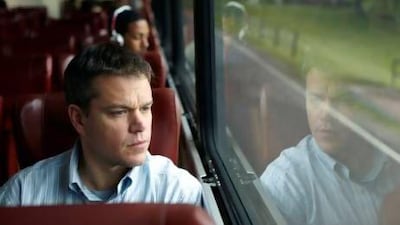A film that had its international premiere at this year’s Berlin Film Festival, Promised Land will open this year’s Abu Dhabi International Environmental Film Festival (ADIEFF).
The drama from the director Gus Van Sant and starring Matt Damon centres on the controversial oil recovery technique of hydraulic fracturing, otherwise known as “fracking”, which involves drilling miles into the Earth and pumping in a pressurised mix of water and chemicals to break up a layer of shale to release the natural gas inside. Although energy companies claim to have been undertaking this practice for decades with only minimal effects, the subject has shot to prominence as environmental groups have taken notice in recent years.
Promised Land sees Damon as a corporate salesman who arrives in a recession-hit US farming town with his sales partner (Frances McDormand), keen to lease drilling rights. Things go well until a local schoolteacher (Hal Holbrook) and environmental advocate (John Krasinski) launch a grassroots campaign to highlight the dangers of the practice.
With the subject of fracking still a hotly contested issue, the film, which is co-produced by Abu Dhabi’s Image Nation (owned by Abu Dhabi Media, which also owns The National) has become something of a hot potato itself. Even before it came out, the subject was raised in the 2010 documentary by the filmmaker and environmental campaigner Josh Fox, Gasland, which was nominated for an Academy Award and claimed fracking polluted drinking water and caused illness.
The pro-fracking filmmaker Phelim McAleer described Gasland as "one of the most influential documentaries of the last 10 years", something that "took a process that's been going on for half a century and made it scary and sinister".
McAleer, a former Sunday Times journalist, used Kickstarter to raise funds for his pro-fracking documentary Fracknation.
Interestingly, Promised Land was initially set to be about wind farms. Krasinski (of The Office, who co-wrote the film with Damon on weekends) began looking at the “American identity” and the break up of small communities. He initially worked with the author Dave Eggers (A Heartbreaking Work of Staggering Genius, Zeitoun) to put together an outline, but when Damon took over, the script’s focus turned to the arrival of wind turbines and their impact on a small town. However, both Krasinski and Damon discovered that the story they had crafted wasn’t true to life.
“We visited this town and realised that none of it was true,” Damon told the UK’s Observer newspaper earlier this month. “We had built the mansion of our dreams on a foundation of clay, basically.”
At the last minute, the story was switched to hydraulic fracturing, a move that resulted in a backlash from the industry before the film had even reached cinemas in the US.
“We’ve been surprised at what looks like a concerted campaign targeting the film even before anyone’s seen it,” said James Schamus, the chief executive of Promised Land’s distributor Focus Features, earlier in the year, pointing to pro-fracking blogs, Facebook pages, internet and cinema adverts that were made in advance of the film.
One Pennsylvania trade group supporting the drilling industry, the Marcellus Shale Coalition, actually bought advertisements to run before the film’s release, asking viewers to dispel “the complete work of fiction” in Promised Land. However, it has been pointed out that none of the website posts or articles published against the film have actually countered any of the claims it makes against fracking.
“To be honest, if I could afford the kind of propaganda specialists the fracking industry has sent after our little movie … They’re pretty impressive at what they do,” said Schamus.
Having started with such a contentious issue, the ADIEFF thankfully closes on April 25 with something that – as yet – hasn’t provoked any response from lobbying groups.
Kon Tiki is the story of the explorer Thor Heyerdahl, who crossed the Pacific in 1947 on a raft made of balsa wood. The 6,920-kilometre journey was a mission to prove that it was possible for South Americans to settle in Polynesia in pre-Columbian times. The drama – by the directors Joachim Ronning and Espen Sandberg – was nominated as Normay’s entry in this year’s Oscar’s foreign language category, losing out to Amour.
Whether it’s balsa wood rafts or controversial drilling techniques that float your boat, the films screening at this year’s ADIEFF should spark some interesting discussions.
Promised Land screens on April 20 at 6pm
Festival facts
About the Abu Dhabi International Environmental Film Festival, which starts on April 20 and runs through April 25
35 films will be screened
The main films and opening and closing ceremonies will be held at the Abu Dhabi Theatre
Tickets to most screenings are free to the public
There will also be free workshops and public screenings of films on the Corniche from 6pm each day
Free workshops and public screenings are also on offer in Al Mirfa in the western region and in Al Ain
The film festival is accompanied by an exhibition of environmental agencies and international organisations as well as a seminar series, both taking place at the Grand Millennium Al Wahda Hotel
For ticket details and other information, visit www.adieff.com
Follow us
Follow us on Facebook for discussions, entertainment, reviews, wellness and news.

